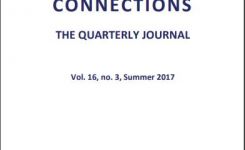- Partnership for Peace Consortium of Defense Aca...
- PfPC Products
- China's Rise, Russia and Color Revolutions, Cen...
China's Rise, Russia and Color Revolutions, Central Asian Power Transfer, Ukraine and its Impact on the Security of Russia and Europe. WINTER 2014

European and Eurasian Security: Viewpoints from Russia
Connections presents diverse views on defense and security by authors from NATO and partner countries from the Partnership for Peace and beyond. For this particular issue we invited authors from universities and research centers of the Russian Federation to express their views on current issues of high interest to academics and policy makers. The response was overwhelming.
In this issue, the PfPC Editorial Board selected contributions addressing the impact of China’s rise, Russian thoughts on the series of “color revolutions” and the Arab Spring, Russia’s relations with Georgia after the parliamentary elections in 2012, the main factors shaping Russia’s foreign policy, the establishment of the Eurasian Union, and the prospects for power transfer in Central Asia, particularly in Uzbekistan and Kazakhstan. Several authors analyze the developments in Ukraine at the end of 2013 and throughout 2014 and their impact on the security of Russia, Europe and Eurasia.
Many readers are likely to find the authors’ viewpoints controversial. Nevertheless, understanding different perspectives may help our readers better appreciate the challenges in resolving some of the problems, particularly where Russian and Western analysts and policy makers have distinct and, on occasion, incompatible views.
We welcome your comments.
The PfPC Editorial Board

